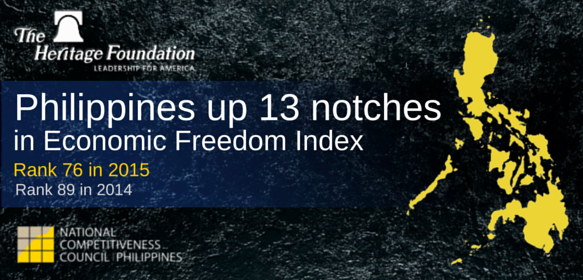- Home
- |
- About Us
- |
- Working Groups
- |
- News
- |
- Rankings
- WEF-Global Competitiveness Report
- Ease of Doing Business Report
- IMD-World Competitiveness Yearbook
- TI-Corruption Perceptions Index
- HF-Economic Freedom Index
- WEF-Global Information Technology Report
- WEF-Travel and Tourism Report
- WIPO-Global Innovation Index
- WB-Logistics Performance Index
- FFP-Fragile States Index
- WEF-Global Enabling Trade Report
- WEF-Global Gender Gap Report
- Gallery
- |
- Downloads
- |
- Contact Us
Philippines Up 13 Notches in Economic Freedom Index

The Philippines moved up thirteen notches from No. 89 to No. 76 out of 178 ranked countries in the 2015 Index of Economic Freedom. The Philippines is the 5th most improved economy this year and the most improved country since 2011.
Published annually by the Wall Street Journal and the Heritage Foundation, the Index measures “a nation’s commitment to free enterprise” and scores economies in ten categories, covering a broad range of factors including court system efficiency, tax rates, investment restrictions, and licensing requirements. Based on the average of these scores, economies are then classified as “free” (score of 80 or higher), “mostly free” (70-79.9), “moderately free” (60-69.9), “mostly unfree” (50-59.9), or “repressed” (below 50).
With a score of 62.2 this year, the Philippines sustained its status as “moderately free” for two years now, improving from its “mostly unfree” category in 2013.
Compared to last year’s index, the Philippines improved its rank in the following: freedom from corruption (up 31, from No. 126 to No. 95), financial freedom (up 30, from No. 69 to No. 39), monetary freedom (up 1, from No. 65 to No. 64), and labor freedom (up 33, from No. 140 to No. 107).
The country slipped in business freedom (down 19, from No. 112 to No. 131), government spending (down 9, from No. 4 to No. 13), fiscal freedom (down 4, from No. 96 to No. 92), trade freedom (down 5, from No. 94 to No. 99), property rights (down 1, from No. 93 to No. 94) and investment freedom (down 1, from No. 80 to No. 81).
The report noted that the Philippines “has charted an upward trajectory” since 2011. The total gain is now 39 places, up from No. 115 in 2011. This makes the Philippines the most improved ASEAN economy, and now, as the most improved economy in the world since 2011.
Among the ASEAN economies this year, the Philippines remains at 4th rank, just behind Singapore (No. 2), Malaysia (No. 31), and Thailand (No. 75). From 2011 to 2013, the country was at 5th place and moved up to 4th place last year, overtaking Cambodia.
“Economic Freedom is important to attracting foreign investors so moving up in this index reinforces signals that the Philippines welcomes investors. At the same time, it is a good diagnostic tool which enables us to identify areas for improvement for the country,” according to Guillermo Luz, private sector co-chairman of the National Competitiveness Council (NCC).
In a Wall Street report on this year’s index, Terry Miller, Director of the Center for International Trade and Economics at the Heritage Foundation, wrote that “for two consecutive years, the region [Asia] has outperformed the other five regions measured in the Index.”
The NCC is a public-private sector body tasked to build up the long-term competitiveness of the Philippines through policy reforms, project implementation, institution-building, and performance monitoring, which have significant contributions to improving the country’s score in major global competitiveness indices.
See also: http://www.competitive.org.ph/rankings/hf-economicfreedomindex.php

